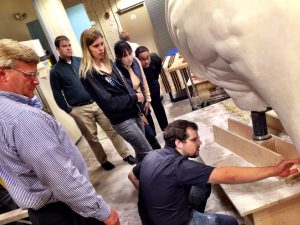NextFab is a 3D printing site located in South Philadelphia that offers a gym for innovation. The company was founded by Dr. Evan Malone, an alumnus of UPenn and Cornell. We had the pleasure to tour the facility last September.
We were able to see lots and lots of equipment for manufacturing objects of many sizes. Laser engravers and 3-D printers/scanners of diverse technologies are the showcase piece. However, innovation cannot be only done with 3-D printers so there are also wood and metal shops, electronics, computer and wet chemistry laboratories, photography studio and spaces for collaboration.
Chemical engineers can benefit of 3-D printing in two major ways, from my personal point of view. The obvious one is to work on the development and improvement of 3D materials and methods. The other one may sound more futuristic. It is the miniaturization of chemical processes. Smaller control volumes behave closer to ideality if coupled with computational fluid dynamics and control systems. This may yield to process intensification but on the other hand, these designs typically involve intricate geometries which may be cumbersome to manufacture. Advanced manufacturing techniques such as 3-D printing could be a true game changer for the chemical industry. The large capital investment typical of our industry are taken down so many chemical start-ups could thrive. Other benefits could be the reduction of risk by reducing the amounts of dangerous raw materials, more sustainable processes by process intensification but manufacturing can happen closer to the customer, and instead of scaling up we could be numbering up the process.
NextFab was a great host. We are very thankful for their hospitality. We had a light dinner was served by Breezy’s Cafe a recommendation by NextFab, which tasted very well indeed.
We are hopeful to have an expert in process intensification in our Professional Development Session soon so we can explore more about the future of chemical engineering.

